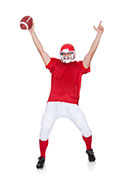- 8 Ways to Increase Dopamine Naturally
- 7 Best Breads for Maintaining Stable Blood Sugar
- Gelatin vs. Collagen: Which is Best for Skin, Nails, and Joints?
- The Long-Term Effects of Daily Turmeric Supplements on Liver Health
- Could Your Grocery Store Meat Be Causing Recurring UTIs?
- Are You Making This Expensive Thermostat Error This Winter?
- Recognizing the Signs of Hypothyroidism
- 10 Strategies to Overcome Insomnia
- Could Artificial Sweeteners Be Aging the Brain Faster?
- Techniques for Soothing Your Nervous System
It’s Natural for Winners to Strike a Victory Pose, Research Shows


Throwing your arms up in the air, raising your head, flashing a smile: your body language when you win at sports is an instinctive reaction meant to indicate dominance over your opponent, a new study finds.
These triumphal displays are made by athletes at the moment they determine they are victorious and include actions such as raising the arms above the shoulders, pushing the chest out, tilting the head back and smiling.
The researchers identified these responses in winners of Olympic and Paralympic judo matches, and they were seen in athletes from all cultural backgrounds, and even among blind athletes, according to the findings published online Jan. 10 in the journal Motivation and Emotion.
However, this type of behavior is strongest in athletes whose cultures emphasize status, the study authors added.
The findings suggest that such responses are natural and based on an evolutionary need to establish order and hierarchy in society, according to study co-author David Matsumoto, a psychology professor at San Francisco State University.
“It is a very quick, immediate, universal expression that is produced by many different people, in many cultures, immediately after winning their combat,” Matsumoto said in a university news release. “Many animals seem to have a dominant threat display that involves making their body look larger.”
Displaying dominance is used in many situations to establish status and hierarchy within a group so that it operates efficiently, he explained.
“If you’re in a meeting, the person sitting in the ‘power chair’ is going to be more erect and look taller, they’re going to use a strong voice, they’re going to use hand gestures that signify dominance,” Matsumoto said. “If there’s conflict, the person who yells the most or is the most stern will be seen as the leader. It establishes the hierarchy in that context.”
More information
The American Psychological Association explains how sports psychologists can benefit athletes.
Source: HealthDay
Copyright © 2026 HealthDay. All rights reserved.










